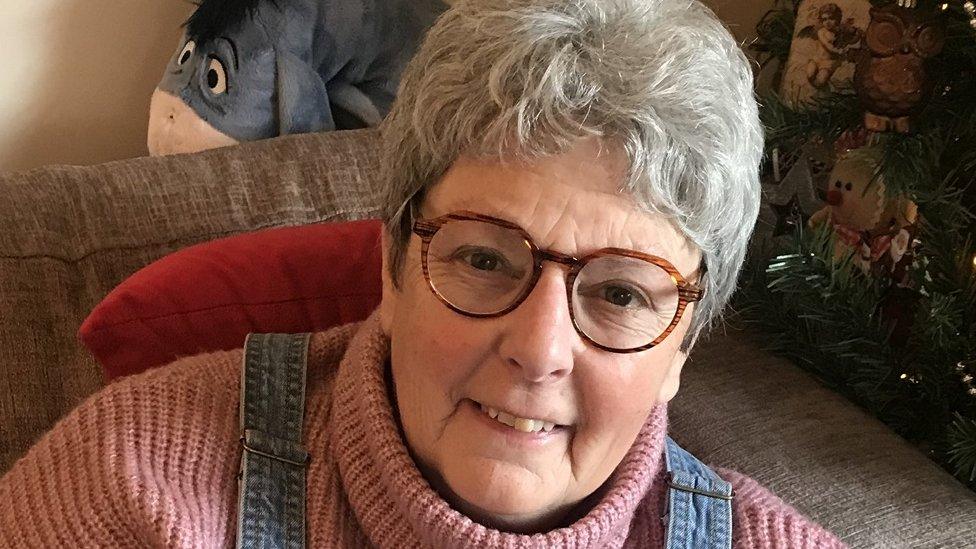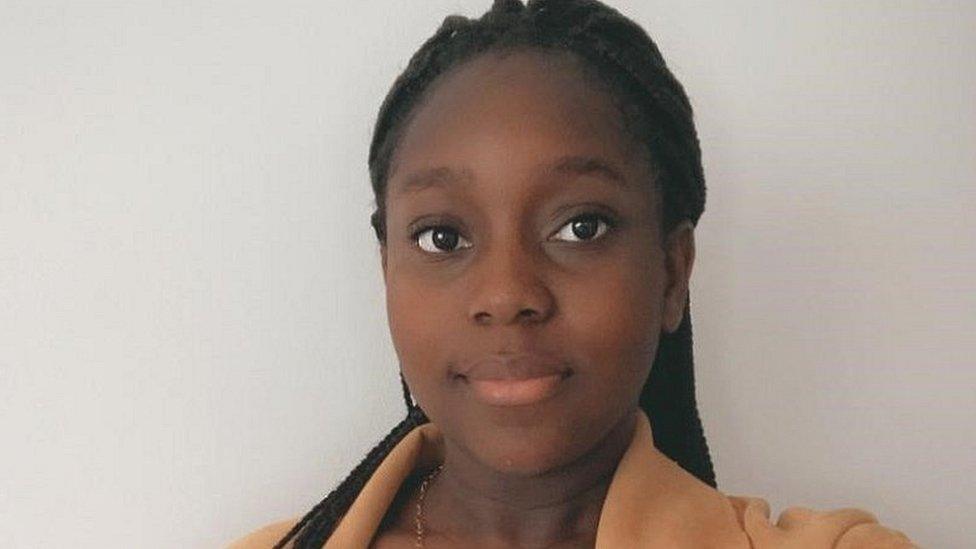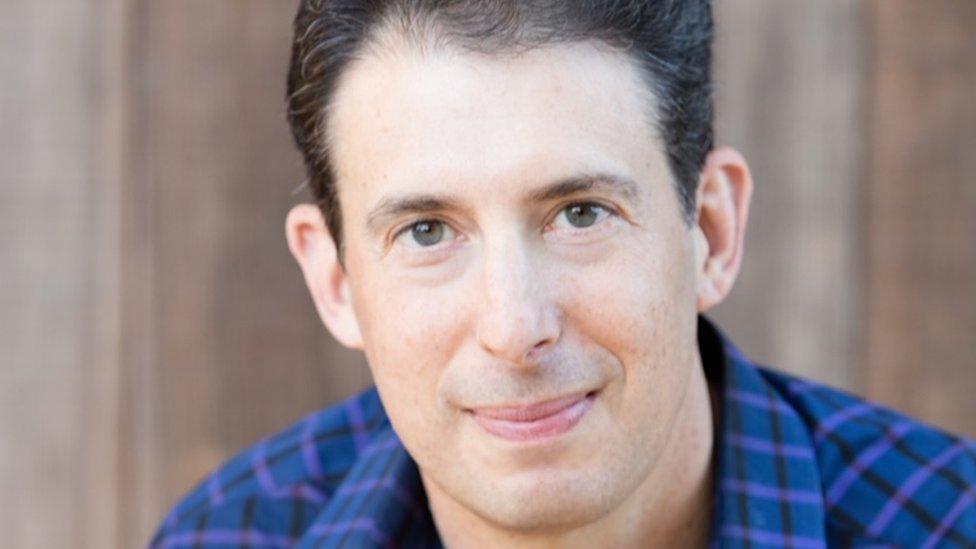Cut off in lockdown: 'Only left home three times since March'
- Published

Liz Grint says her family has had to find a new way of living after months of isolation
Millions might feel lonely in the lockdown, but every type of loneliness is individual. Here are five very different ways of living with loneliness.
A photograph of fish and chips was one way that Liz Grint tried, in a symbolic way, to tackle a sense of loneliness and separation.
She is a carer for her husband, Carl, who is 73 and has multiple health problems - and he has only been able to leave their home three times since March.
The couple, living near Norwich and married for 48 years, have reshaped their lives during the pandemic, with almost eight months of isolation so far.
"Everyday life is totally different now.
"People say it must be so tough on you - but I've got so used to doing it," says 68-year-old Liz.


Beating loneliness
Millions of people, young and old, are facing loneliness, isolation and separation during the lockdown. A BBC News project on TV, radio and online reveals some of their stories and how they are fighting back.
First-hand experience on beating loneliness from a 91-year-old
Gaming and friendship apps: How young people are staying in touch
Make connections through BBC Local Radio's Make a Difference campaign
If you or someone you know is affected by any of the issues raised, BBC Action Line has a list of organisations and charities offering advice and support

Carers UK has highlighted how carers have been so isolated during the lockdown and cut off from the respite they might badly need.
Liz is lonely for the life she is missing: seeing friends, going to church, meeting family, going to the shops.
But when she realised how much she was missing going to buy fish and chips, Liz asked friends to go for them and send back a picture.
"So they went down and bought fish and chips, sat on one of the benches and took a photograph of them when they had started eating," says Liz. They were having a treat by proxy.

Carl has only left home three times since March
She reads, knits and sews to pass the time, but can no longer stand looking at the news and some Zooms just make her feel even more lonely.
"We're just in a little bubble now," she says.
"I think we've got resigned to this now. This is what life is all about.
"In some ways, because of what we've had to do, we're more content - because there's no point wanting anything else.
"What really matters to me is my family, keeping them safe."


Elorm says she has the feeling of looking out and seeing other people enjoying themselves
"It feels like the whole world is moving - and you're not," says Elorm Fiavor, a young carer looking after her mother in Salford, describing how it feels to be 16 and lonely.
"It's like everything is just going on in my head. My situation is slow, and I'm looking outside and see other people my age and their lives are moving fast and they are having fun," says Elorm.
Because of her mother's sickle cell anaemia, and the need to shield her, Elorm has had stay inside, missing out on "that teenage experience of making plans to go out on Saturday".
She's had to face up to being lonely and has become part of a charity project, Lonely Not Alone, that is helping young people to challenge the stigma of loneliness.
"I think I've been forced to grow up," she says.


Vruti Patel says pregnant women are missing out on the advice and company of other mothers-to-be
Vruti Patel is expecting her first baby. "I've felt really lonely - I just want another mum to talk to," she says.
Unable to attend ante-natal classes and working from home, the 33-year-old from London says she's felt cut off from mutual support.
If she's worried about her pregnancy, "I want to hear someone say it's totally normal".
"Loneliness is a very big issue - but it's not as much talked about. It needs to be brought to light," says Vruti.
She's turned to technology to connect with other expectant mothers through a social networking app called Peanut.
But she thinks the isolation and loneliness of pregnant women during the pandemic needs much more attention.
"It's a much bigger impact than being able to go to the pub," says Vruti.


Eric Klinenberg says that occasional loneliness has become part of modern living
Eric Klinenberg, an author and professor at New York University, says loneliness has been changed in the pandemic.
"Has it taken on a new dimension? Sure. But what hasn't?" says Prof Klinenberg.
"It's a very hard time to be living alone. It's also a very hard time living with other people. It's just a hard time to be living.
"I'm married with kids and I certainly didn't sign up for living in the same house 24/7, fighting over everything all the time."
He argues that being independent and individual brings with it the greater likelihood of being lonely sometimes.
"We've experienced loneliness for a long time - it's a feature of modernity," he says.

"Living on your own, you're more isolated anyway," says Niall Herron, a 53-year-old living in London, who argues a big city population isn't necessarily a defence against feeling alone.
He has suffered from depression and takes conscious steps to avoid loneliness, which he says in the past has been a problem for him.
"A cup of coffee with someone can completely change it," he says.
"The lockdown has made me realise we're social animals. We're not meant to be in isolation."
He says that loneliness itself is like a "separate illness".
Niall is gay and says that while growing up, he faced a lack of acceptance that was a form of loneliness - and he is determined not to allow it to take root in his life now.
He is involved in the Oasis church group and does voluntary work a couple of days a week, maintaining connections and keeping around people. Even going to the supermarket can "lift your spirits", Niall says.
"You have to be careful with your loneliness."